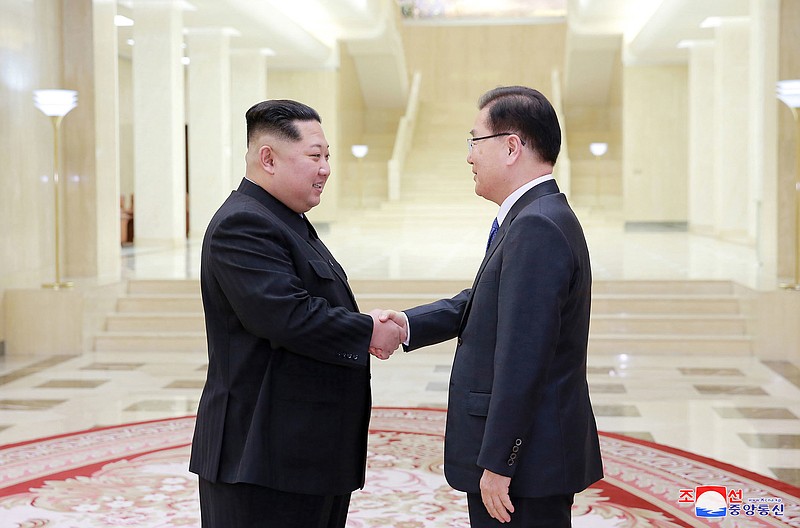Could a Donald Trump presidency accomplish with North Korea today what a Ronald Reagan presidency did with the Soviet Union in the 1980s or what a Richard Nixon presidency did with China in the 1970s?
It's a long shot, you'd have to concede, but enticing the dictatorship to give up its nuclear arsenal would be a strategic global coup of little modern parallel.
We shouldn't kid ourselves that we're anywhere near such a momentous occurrence, though. To date, North Korean leader Kim Jong Un has said only that he is willing to discuss his nukes with the United States, has agreed to meet with South Korea's president next month, and has shown a willingness to suspend nuclear and missile tests during such talks.
Nevertheless, that's a huge step. On the other hand, North Korean leaders have made promises before, promising denuclearization in 1994 during the Clinton administration and again in 2005 under the George W. Bush administration, only to back off both times.
Trump, like Reagan with the Soviet Union and Nixon with China before him, would be the last statesman you would expect to make a rapprochement with the East Asia country. After all, he's blustered about the country's moves since he took office in 2017, has seemed to threaten military action and even began calling its leader "Little Rocket Man." Democrats and the leftist national press were so incensed, they accused him of trying to start a war.
Meanwhile, the president pushed through what an Associated Press report called "some of the harshest sanctions any country has ever faced."
"I think sanctions are finally beginning to bite," Dr. Sue Mi Terry, a former CIA North Korea analyst, told CNN Tuesday, "and they're looking for sanctions relief."
She said "they're also watching very closely what's coming out of Washington, and all of this talk of [a] bloody nose and limited strike[s] and so on, I think spooked them."
Negotiating from a position of relative strength worked for Nixon's team with China and for Reagan's team with the Soviet Union, though the circumstances were each a bit different.
Nixon, the dedicated anti-communist but ever the global strategist, saw pluses to a deepening relationship with communist China before winning the presidency in 1968. It would offer general flexibility on the world scene, according to former National Security Council staffer Winston Lord. It also would get the attention of - and perhaps bring more leverage to our dealings with - the Soviet Union, and would put pressure on the North Vietnamese to bring an end to the Vietnam War, he said.
Although the president's historic visit to China didn't come until February 1972, he had worked through back channels - leaving out the State Department he did not trust - to achieve such an end since his first days in office more than three years earlier.
"On a global scale," the Office of the Historian for the Department of State concludes, "rapprochement fundamentally altered the context of the Cold War and influenced the subsequent movement towards détente between the United States and the Soviet Union."
Reagan, considered by the left to be a "cowboy" on foreign policy before his election and infamously termed "an amiable dunce" by John F. Kennedy/Lyndon Johnson consigliere Clark Clifford, often referred to the Soviet Union as the "evil empire." Once, while doing a microphone check early in his presidency, he said, "I've signed legislation that will outlaw Russia forever. We begin the bombing in five minutes."
His utterances made the left apoplectic, and you could hardly pick up a news magazine in his first term in which someone didn't make a statement about his moving the country dangerously close to nuclear war.
Instead, of course, by just over a year into his first term, Reagan was publicly expressing his desire to eliminate all nuclear weapons. In fact, according to many of his biographers, he'd held similar opinions for years.
"They've deprived their people," he said of the Soviet Union in an editorial board meeting with The New York Post on March 23, 1982. "They've lowered their standards of living just to continue with this massive buildup. And I must say they've been tremendously successful with it. This is one of the reasons why we can't retreat on what we're doing, because I believe we've come to the point that we must go at the matter of realistically reducing if not totally eliminating the nuclear weapons - the threat to the world."
By the end of his second term, Reagan and Soviet leader Mikhail Gorbachev signed a major arms control agreement and made substantial progress on a second one. And 10 months after he left office, the Soviet bloc began to crumble, the Berlin Wall fell separating communist East and free West Germany, and the Cold War was considered over.
On the surface, Trump has neither the geopolitical understanding of Nixon nor the persuasive qualities of Reagan. But he is in a position of strength with North Korea and has room to negotiate. Stranger things have happened.
We hope we have come to another one of those pivotal moments in history.
